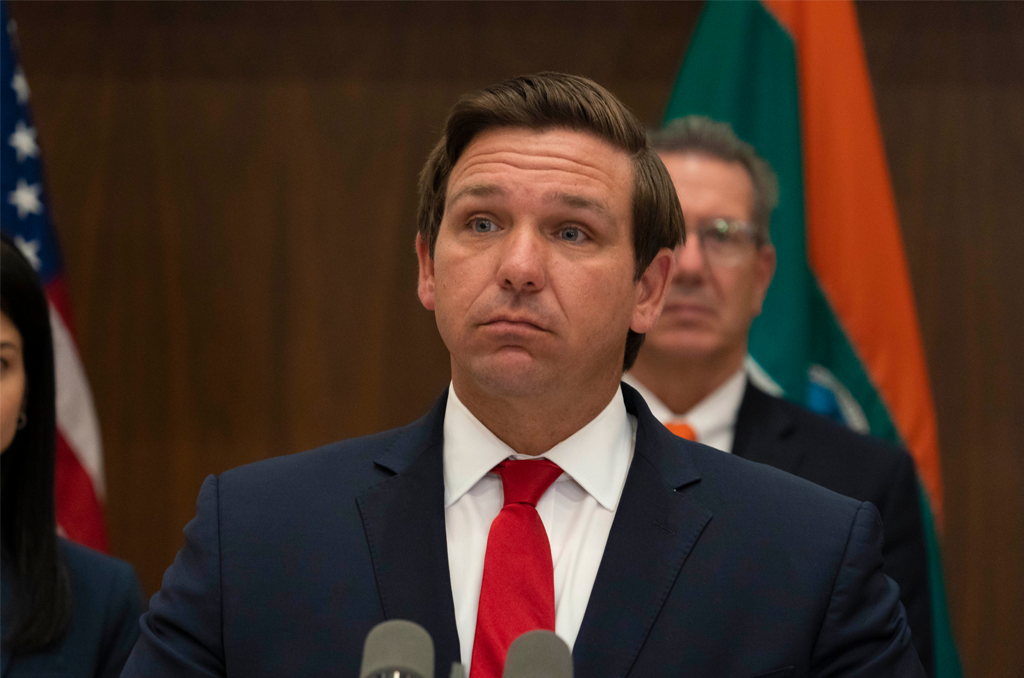Anti-drag law denied by the court – Florida Gov. Ron DeSantis – Courtesy: Shutterstock – Image by Hunter Crenian
Florida’s plea to temporarily enforce a statute that makes it a criminal to allow children to drag acts was denied by a split Supreme Court on Thursday. As long as a Florida restaurant challenges the law, the state cannot enforce the statute anyplace in the state, according to the brief, unsigned order.
Clarence Thomas, Samuel Alito, and Neil Gorsuch, three judges, said they would have approved the state’s application but did not elaborate on their votes.
In a three-page statement, Justice Brett Kavanaugh—joined, except for a single footnote, by Justice Amy Coney Barrett—explained why the court had rightfully rejected the state’s request, citing the likelihood that the justices would not grant review and address the issue the state had raised at this point in the proceedings.
In 2023, Florida Governor Ron DeSantis signed the Protection of Children Act into law. Admitting a kid to “adult live performances,” which are described by law as those that involve, among other things, “the lewd exposure of prosthetic or imitation genitals or breasts,” is a misdemeanor. Many people believe that drag shows are the aim of the law.
Hamburger Mary’s, an Orlando restaurant chain that presents drag acts, including ones deemed “family-friendly,” filed a constitutional challenge against the statute in federal court, claiming that it is unconstitutional. Florida officials are prohibited from implementing the law anywhere in the state by U.S. District Judge Gregory Presnell, who found that it is in violation of both the due process and First Amendment clauses.
The state petitioned the Supreme Court on October 19 to stay the implementation of Presnell’s order while it pursues its appeal after the U.S. Court of Appeals for the 11th Circuit refused to postpone it to the degree that it extends beyond Hamburger Mary’s.
Henry Whitaker, the attorney general for Florida, informed the court that Presnell’s order was overly wide. Rather than just prohibiting the state from using the anti-drag legislation in any part of Florida, he might have simply issued an order that would have prevented Hamburger Mary’s from being prosecuted. Whitaker stated that Presnell’s order “inflicts irreparable harm on Florida and its children by purporting to erase a law designed to prevent the exposure of children to sexually explicit live performances from Florida’s statute books.”
The justices were asked by Hamburger Mary’s to uphold Presnell’s order. The restaurant contended that since existing state laws already forbid minors from viewing sexually explicit content, the injunction would not have a negative impact on the state. The restaurant further stated that the state has not attempted to expedite its appeal in the 11th Circuit, where it has actually requested two extensions of time to file its opening brief, contradicting its claim that it will suffer grave consequences if the law is kept on hold nationwide.
Furthermore, the restaurant argued that, in contrast to the state’s claim, it is not sufficient to prevent the state from implementing the drag ban against Hamburger Mary’s because the establishment does not operate and display its performances in a vacuum. The restaurant clarified that other venues “may be subject to penalties under the Act for the same performances by the same performers” unless the drag ban is banned statewide because the same artists who appear at Hamburger Mary’s also play elsewhere in the state.
The judges denied the state’s motion in a succinct ruling on Thursday afternoon. Florida “does not raise that issue” in its papers with the Supreme Court, according to Kavanaugh, despite the fact that the state “strongly disagrees” with the trial court’s finding that the law violates the First Amendment. Rather, Kavanaugh pointed out, the state was just trying to get the authority to apply the statute to organizations that aren’t involved in the legal dispute. “An important question that could warrant our review in the future” is whether district courts have the authority to issue an order prohibiting the government from executing a statute against non-parties. Kavanaugh acknowledged this. However, Kavanaugh found that the case is an “imperfect vehicle” to analyze the procedural matter because of the setting in which it arises—a First Amendment complaint arguing that a law sweeps too broadly—and therefore the court was justified to reject the review.
Barrett concurred with Kavanaugh’s opinion with the exception of one footnote, in which Kavanaugh stated that the federal law governing administrative agencies separates the question of whether district courts can issue an order preventing the government from enforcing a law against non-parties “from the issue of a court’s setting aside a federal agency’s rule.”
Stories that matter are our priority. At Florida Insider, we make sure that the information we provide our readers is accurate, easy-to-read, and informative. Whether you are interested in business, education, government, history, sports, real estate, nature or travel: we have something for everyone. Follow along for the best stories in the Sunshine State.
Chris began his writing as a hobby while attending Florida Southern College in Lakeland, Florida. Today he and his wife live in the Orlando area with their three children and dog.

